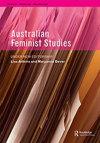Queer Ecologies of Death in the Lab: Rethinking Waste, Decomposition and Death through a Queerfeminist Lens
IF 1.5
4区 社会学
Q2 WOMENS STUDIES
引用次数: 4
Abstract
ABSTRACT In this article I explore human and transgenic fruit fly relations in the laboratory and in relation to everyday practices of waste management. I rely on ethnographic material collected from one year of participatory observation in an Alzheimer’s laboratory in Sweden, in which scientists work with Drosophila Melanogaster, commonly known as fruit flies. Grounding myself within new materialism, posthuman theories and queer theories, I explore queer ecologies of death in the lab as a material-discursive phenomenon. I discuss how heteronormative and humanistic ideologies about ‘purity’ and ‘pure Nature’ shape the space of the laboratory and regulate waste management practices. However, as I present, the materiality of the living and dead matter problematises such fantasies of purity and pre-described categories of laboratory waste. Flies’ bodies, living and nonliving, cross the boundaries between inside and outside, natural and unnatural/artificial, safe and hazardous waste, and life and death, creating queer ecologies of death. Queer ecologies of death suggest new modes of thinking about agency, (non)human and (non)living within the context of laboratory waste management that go beyond the limits of human exceptionalism and modernist hierarchical binary logic that is essential to and constitutive of the notion of purity and the imaginary of a pure nature out there.实验室中的酷儿死亡生态:从酷儿女权主义视角重新思考废物、分解和死亡
摘要在这篇文章中,我探讨了人类和转基因果蝇在实验室中的关系,以及与日常废物管理实践的关系。我依赖于在瑞典阿尔茨海默氏症实验室进行的一年参与性观察中收集的民族志材料,在该实验室中,科学家们与果蝇(俗称果蝇)合作。我立足于新唯物主义、后人类理论和酷儿理论,在实验室中探索死亡的酷儿生态,将其作为一种物质话语现象。我讨论了关于“纯粹”和“纯粹自然”的非规范性和人文主义意识形态如何塑造实验室空间并规范废物管理实践。然而,正如我所说,活物质和死物质的物质性问题使人们对实验室废物的纯度和预先描述的类别产生了幻想。苍蝇的身体,有生命的和无生命的,跨越了内部和外部、自然和非自然/人造、安全和危险的废物以及生命和死亡之间的界限,创造了奇怪的死亡生态。酷儿的死亡生态学提出了在实验室废物管理的背景下思考机构、(非)人和(非)生活的新模式,这些模式超越了人类例外论和现代主义等级二元逻辑的限制,而现代主义等级逻辑是纯粹概念和纯粹自然想象的本质和组成部分。
本文章由计算机程序翻译,如有差异,请以英文原文为准。
求助全文
约1分钟内获得全文
求助全文
来源期刊

Australian Feminist Studies
WOMENS STUDIES-
CiteScore
2.50
自引率
0.00%
发文量
7
期刊介绍:
Australian Feminist Studies was launched in the summer of 1985 by the Research Centre for Women"s Studies at the University of Adelaide. During the subsequent two decades it has become a leading journal of feminist studies. As an international, peer-reviewed journal, Australian Feminist Studies is proud to sustain a clear political commitment to feminist teaching, research and scholarship. The journal publishes articles of the highest calibre from all around the world, that contribute to current developments and issues across a spectrum of feminisms.
 求助内容:
求助内容: 应助结果提醒方式:
应助结果提醒方式:


